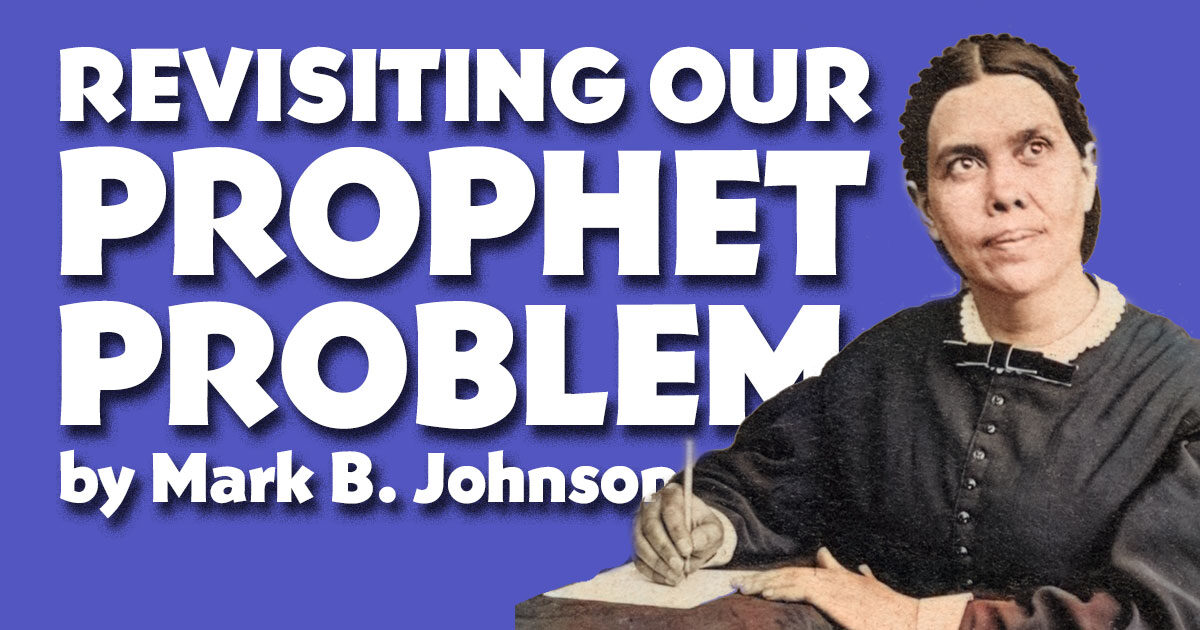Revisiting Our Prophet Problem
by Mark Johnson | 25 February 2025 |
Why don’t we just bite the bullet and admit it?
We fell into the infallibility trap, and we now have a prophet problem.
She may have lied about the authorship of much of her body of work. She might have done it all to enrich herself and her family. Her historical and health science sources were questionable. She seemed to under-appreciate her staff. She possibly was not inspired, but had “visions” at will to manipulate impressionable and vulnerable followers. It appears that her mental health status was occasionally problematic. She cheated on the diet she prescribed for others. She wore pearl necklaces while frowning on the use of jewelry. There’s evidence she was a troubled wife and a neglectful mother.
Perhaps we should just toss out her writings and expunge whatever influence she still may have on our church. Perhaps we should no longer fear the Investigative Judgment, or make excuses for being overweight, or maybe we should quit worrying about losing self-control when we eat eggs.
Perhaps we ought to throw out Fundamental Beliefs 8, 13, 18, 22, 24, and much of the wording used to defend the others. We could sell our schools and turn our health care facilities into for-profit hospital systems. We could stop pretending we alone are the remnant.
Perhaps.
Then what? What would we have left?
Well, it looks like we’d pretty much be a run-of-the-mill evangelical Protestant denomination that just happens to worship on Saturday. We could still believe in freedom of conscience, the Trinity, the Sabbath, the inspiration of the Bible, Creation, baptism by immersion, forgiveness of sins, the Eucharist, the Incarnation, the Atonement, righteousness by faith in Christ alone, the soon return of Christ at His Second Coming, the hope of salvation, an evangelistic mandate, the damnation of the wicked, and a strong church foundation.
And we could finally have local congregational autonomy! We wouldn’t need to focus on tithe so much. And we could eat bacon cheeseburgers without guilt.
And yet….
I feel like we might be throwing some babies out with the bath water. Is there nothing of value that she brought to us? Is it just possible that her influence has had a beneficial effect on us, despite her many problems and our reluctance to admit her humanity? Is it possible that much of the calumny she has received has less to do with her plagiarism, her character flaws, her faulty historical accounts, her demanding limitations on Christian behavior, or her persnickety and dated advice on diet and health, than with unconventional beliefs that call evangelical Reformation theology into question?
Perhaps, instead, we should rethink our purpose as an institution.
What if the heart of our church were the discovery and dissemination of truth instead of the survival of the organization and its entities? What if instead of claiming we get our truths and beliefs from the writings of our prophet, we diligently studied the Scriptures for an intelligent understanding of the reasons for our faith? What if we put Sister White aside and focused on finding out what the Lord God of Israel says—and then did what He commands? What if we used our reasoning powers to become intellectual Christians?
Ellen and me
I’ve had a lifelong love-hate relationship with Ellen White. For most of my youth, I pretty much hated her. Granted, I didn’t spend much time getting to know her writings. I read her works mainly for class assignments. She seemed negative and judgmental. Some of her writing seemed like science fiction. Much of it was too flowery and sentimental for my taste. A large part of it scared me. Mostly though, she called into question some of my favorite activities and added guilt to how I lived. I welcomed her scholarly critics. I didn’t really read what they said, but they gave me a good excuse not to read her.
And then, in the 1970s, I moved to California.
I’m a product of what has derogatorily been called West Coast Theology. There were prominent Adventist thinkers who all taught and preached in California in the 1970s. They were frowned on by the more conservative denominational brethren. Seminary students in Michigan were advised to not read their writings or listen to the widely circulated recordings of their classes and sermons. It was claimed they taught heresy. They downplayed the law. They admitted to being “skeptical”—shorthand for having their eyes wide open.
They led me back to both the Bible and Ellen White.
They had far more respect for her than I have found in many of the graduates of our seminary. While they readily accepted her limitations, they did not freeze her in space and time. Her plagiarism didn’t dominate their thoughts. They recognized that over time she grew theologically and spiritually. They acknowledged that she was open to reviewing and revising her beliefs. Yet they still found great value in her writings. They found that taken as a whole, her work brought sense to a denomination that otherwise appeared inconsistent, or even foolish, at times.
Jack Provonsha spoke for many of them when he wrote:
“I have quoted liberally from Ellen G. White. I make no apology for this. She is my ‘spiritual mother.’ She has also been absolutely central to the life and thought of Adventism.”
Ellen White read widely and copied freely. She was obviously influenced by some rather unconventional pastors and physicians. But in her writings, especially those from Australia, where she was banished for a period by the church leaders because they were upset by her support for the “new” doctrine of righteousness by faith, she wove together her thoughts with passages and views from other writers that resulted in some of the most encouraging and pastoral Christian writings I have read.
Some might even say they were inspired.
Be honest about Ellen
I think we would do well as a church to publicly admit Ellen White’s faults and shortcomings, and then review and rethink in a less doctrinaire way what it was that she gave to us. We should stop trying to exonerate or canonize her. We should see if her work, flawed as it may be, adds, or clarifies, anything important to Christian theology.
Because of her long career and voluminous body of work, it is possible to make her say many things that appear foolish or contradictory. However, as Yuval Noah Harari points out in his book, Nexus, we tend to fall into infallibility traps. We “humans have often fantasized about some superhuman mechanism, free from all errors, that (we) can rely upon to identify and correct (our) own mistakes.” Such sources are established by religious bodies as “infallible superhuman authorit(ies), and are therefore free from all possibility of error, and should never be questioned or changed by fallible humans.”
Christians have done this with the Bible. Islamists do it with the Qur’an. Adventists have done it with Ellen White’s writings.
It is a fool’s errand. There is no such human mechanism, including the Bible, that is error-free. Instead, we are called upon to use our “kingly power of reason” to be “thinkers, and not mere reflectors of other men’s (or women’s) thought.” But thinking is hard work. It makes those who have memorized their authorities both angry and worried.
I lack the space in this article to expand on the themes she emphasized, or to substantiate with text and reference why I eventually fell in love with the writings of Ellen White, even if they may not be perfect. I find in her work a consistent logic that I personally would miss if we discarded her work. For me, she makes sense out of nonsense. Her writings are often direct, clear, yet unsophisticated. They are not unique to her, but she consolidates and describes her beliefs in a more thorough and complete way than I have found elsewhere.
She believed in a Creator behind creation. She believed in a Ruler behind the rules. She believed that Sin leads to sins. Of great interest are her stories behind the Story—what we have called the Great Controversy. It’s a biblical theme found in the works of many other writers from whom she clearly copied, men such as John Milton and Henry Melville. But Ellen White is unparalleled in her description of universal events “behind the scenes.” The war in heaven, the battle for the soul of every creature, the demand of the adversary to be worshipped, and the explosive victory of Christ on the Cross make rational sense out of much that we find in the Bible that has often been interpreted unreasonably.
Ellen and the gospel
I believe Ellen White’s greatest contribution, however, was her single-minded emphasis on the good news behind the Gospel. The Good News behind all other good news is the character of God. He is righteous and He is good. If that were not so, the thought of living eternally with Him would be terrifying. Christ’s message to the world is essentially the revelation of the love and trustworthiness of God.
The gospel of Adventist and evangelical Christianity seems too often focused on “me.” Jesus suffered and died to forgive me, to cleanse me, to save me, to keep me out of hell. That’s good news! But Jesus said there was more. Much more. In fact, my salvation is far from being the most important thing. The safety and stability of the universe depends on the greater Good behind the gospel, and Ellen White expounded on that goodness, found only in God.
It’s possible that Ellen White was a charlatan, but as Philip Yancey has said, “We are all in peril if the flawed messenger invalidates the message.”
 Mark B. Johnson is a graduate of Pacific Union College and Loma Linda University, with a medical residency at Johns Hopkins University in Preventive Medicine and Public Health. He is the local public health officer in the Denver metropolitan region. He’s an adult Sabbath School class teacher and church board chair at the Boulder Adventist church.
Mark B. Johnson is a graduate of Pacific Union College and Loma Linda University, with a medical residency at Johns Hopkins University in Preventive Medicine and Public Health. He is the local public health officer in the Denver metropolitan region. He’s an adult Sabbath School class teacher and church board chair at the Boulder Adventist church.
To comment, click/tap here.




